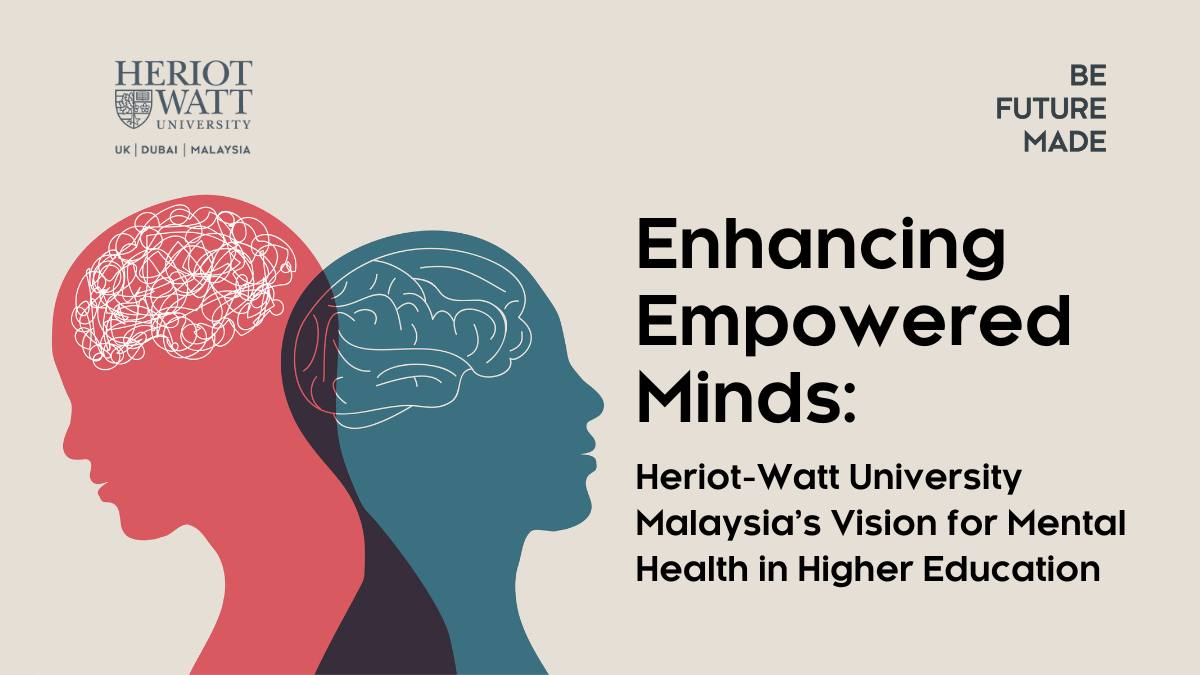Published:

In today's rapidly evolving world, the journey of life places ever-increasing tests on the resilience of our university students, challenging them not only academically but also mentally. The pursuit of knowledge is intrinsically linked with personal growth and development, and universities can serve as key facilitators of transformation.
As we approach World Mental Health Day on October 10, it is imperative that we engage in the vital conversation about prioritising mental health, particularly within the context of young adults navigating higher education.
The National Health and Morbidity Survey (NHMS) conducted by the Ministry of Health (MOH) in 2015 revealed alarming statistics: 1 in 3 Malaysians grapple with mental health issues, with the highest prevalence among those aged 16-19 years and individuals from low-income families.
In response to these challenges, the Malaysian government has embarked on a journey to dismantle stigma and reshape societal perceptions of mental health. In 2021, the Ministry of Health, Malaysia, introduced the Mental Health Strategic Plan 2020–2025, designed to promote mental well-being through the enhancement of mental health services.
In alignment with these commendable initiatives, several noteworthy efforts have been undertaken to enhance mental health service accessibility across Malaysia. One of these initiatives involves the allocation of RM50 million in matching grants to Yayasan Hasanah under the Hasanah Special Grant 4 programme. These funds are aimed at bolstering mental health services and resources throughout the country, reflecting a significant commitment to addressing the mental health needs of Malaysians. Additionally, the establishment of the Talian HEAL hotline stands as an important milestone in this commendable advocacy movement that Heriot-Watt University Malaysia (“HWUM”) wholeheartedly supports.
Furthermore, these initiatives align with HWUM's unwavering commitment to a positive approach to education that is driven by purpose, emphasising the holistic development of our students, with a focus on three fundamental pillars: academic excellence, the nurturing of mental and physical well-being, and the cultivation of character.
Prioritising Mental Health in Higher Education
With mental health cases on the rise, universities have an indispensable role to play in promoting the psychological and emotional well-being of their students. This responsibility is magnified in Malaysia, a diverse and fast-developing nation, where academic pressures, financial concerns, and the evolving nature of university life converge to create a web of intricate challenges.
In addition, promoting mental well-being within our educational institutions is our collective responsibility. We must create nurturing environments that empower students to excel both academically and mentally. The pursuit of knowledge and personal growth should enhance, not undermine, mental health, fostering holistic development and resilience among students.
This is precisely why HWUM is a firm believer in purpose-driven education, aiming to nurture future purpose-driven leaders who excel not just academically but possess the skills and attitudes required to thrive in an increasingly uncertain and complex world.
As an example, among other essential skills, the EmPOWER programme at HWUM equips our students with tools to develop self-awareness, emotional intelligence and people skills, experience and communicate positive emotions, while guiding them in discovering their sense of purpose.
Within the Psychology Department at HWUM, purpose-driven education is not just an abstract concept; it is a living reality. Students are active participants in their own mental health journeys rather than passive recipients of knowledge. They learn how to overcome stress, anxiety, and adversity, and harness the powers of gratitude, mindfulness, and empathy as tools for forging meaningful connections and enhancing their own well-being.
Our efforts extend far beyond the classroom. Through our partnerships with industry and NGOs, we impact the community and the world at large. We offer workshops, seminars, and resources that overcome the barriers to individuals accessing the support and knowledge they need. Furthermore, our students and faculty are engaged in research that seeks to unravel the complexities of mental health, shedding light on novel approaches to support individuals in their quest for happiness and fulfilment.
A Unified Effort for Better Mental Health
Last year, we joined forces with the Green Ribbon Group (“GRG”) to empower young people to promote positive mental health. We formalised our collaborative effort through a 1.5-day training programme called The Green Ribbon Effective Agent Training (GREAT) Project.
Through The GREAT Project, both parties committed to creating and mobilising community champions among young people, known as Green Ribbon Ambassadors. A total of 30 ambassadors were equipped with mental health literacy training to empower their ability to raise awareness of mental health issues among their peers. This includes breaking down mental health stigma, providing interim support to their peers, and designing their own mental health advocacy campaigns.
Addressing these concerns necessitates a collective and dedicated effort. Students can play a pivotal role by offering understanding and encouragement to their peers. Concurrently, staff members must remain vigilant in recognising signs of mental health challenges and guiding students to appropriate resources to help them overcome their battles.
Conclusion
Universities have a responsibility to cultivate environments in which mental well-being stands as a primary concern. World Mental Health Day gives us all an opportunity to renew our commitment to raising awareness, dismantling stigma, and creating supportive spaces where every student can flourish, fortified by initiatives on mental health.
In these endeavours, we find hope, for it is through education and understanding that we can build a world where mental health is truly a human right, cherished by all, and denied to none. Together, we can make this vision a reality.
Professor Glenn Hitchman
Professor and Head of Psychology, School of Social Sciences
Heriot-Watt University Malaysia